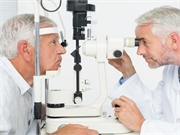- Could Your Grocery Store Meat Be Causing Recurring UTIs?
- Are You Making This Expensive Thermostat Error This Winter?
- Recognizing the Signs of Hypothyroidism
- 10 Strategies to Overcome Insomnia
- Could Artificial Sweeteners Be Aging the Brain Faster?
- Techniques for Soothing Your Nervous System
- Does the Water in Your House Smell Funny? Here’s Why
- Can a Daily Dose of Apple Cider Vinegar Actually Aid Weight Loss?
- 6 Health Beverages That Can Actually Spike Your Blood Sugar
- Treatment Options for Social Anxiety Disorder
Many Americans in the Dark About Eye Health

Though good vision is critical, a new survey finds that most folks fall short when it comes to knowledge about eye diseases.
The American Academy of Ophthalmology (AAO) commissioned the online survey of more than 3,500 U.S. adults aged 18 and older.
While the survey found that 81% said they’re knowledgeable about vision health, only 19% knew the three main causes of blindness in the United States: glaucoma, age-related macular degeneration and diabetic eye disease.
Only 47% knew that vision loss and blindness don’t affect all people equally, and just 37% knew that people don’t always have symptoms before they lose their vision to eye diseases. In addition, less than half (47%) knew that because it adapts to vision loss, the brain can make it difficult to know if you are losing your vision.
“Far too often, we witness the consequences of patients entering the ophthalmologist’s office too late to avoid severe vision loss,” AAO president Dr. Anne Coleman said in an academy news release.
“In 2020, we want all Americans to have clear vision when it comes to eye health. That starts with educating yourself about eye diseases and visiting an ophthalmologist,” she said.
Healthy adults should see an ophthalmologist for a baseline eye exam by age 40 and have their eyes checked every year or two at age 65 or older, the AAO recommends.
The survey, commissioned last summer, also revealed that many respondents weren’t aware of the links between vision loss and other health problems. Even though 57% knew that vision loss increases the risk for injury or death, only 24% knew that vision loss is associated with psychological problems, such as social isolation and depression.
Research shows that people fear vision loss more than they fear other serious health problems, such as cancer, stroke and heart disease. This survey reveals that despite that fear, Americans know very little about vision loss, according to the AAO.
More information
The U.S. National Eye Institute offers eye health tips.
Source: HealthDay
Copyright © 2026 HealthDay. All rights reserved.










